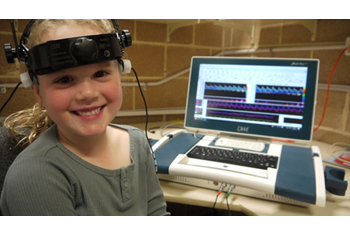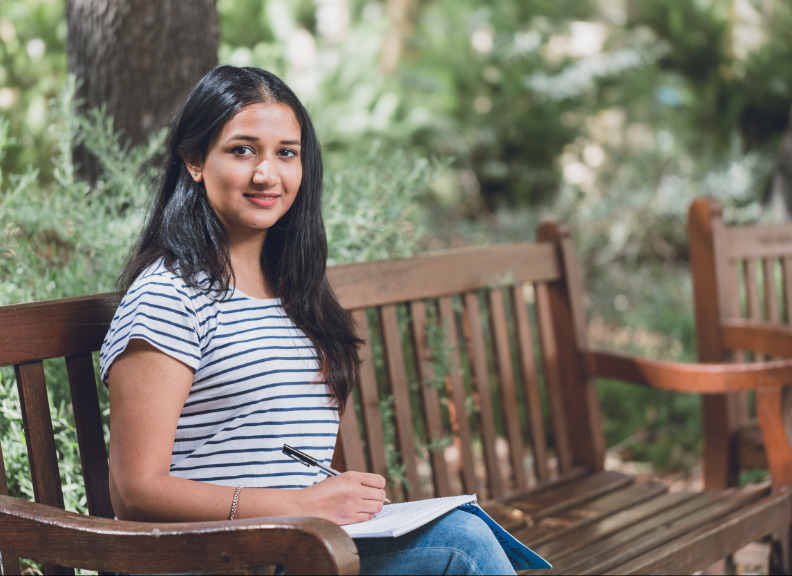Research
Developmental psychology
Uncovering individual developmental paths
We change dramatically over the course of our lives. Development isn’t complete when we reach adulthood; it’s a lifelong endeavour. Consider the different thoughts, abilities and behaviours of an infant versus a school-aged child, and you’ll understand the massive and rapid intellectual and cognitive changes that occur over an individual’s lifespan.
Developmental psychology studies a range of developmental stages, skills and abilities. We seek to understand how people progress through psychological development throughout their lifespan, such as social skills or memory. Our research investigates different developmental paths for individuals with conditions such as autism or Parkinson’s and how we can encourage individuals to develop and age along their optimal path.
Research laboratories
Developmental psychology researchers work across the following laboratories.
- Healthy Ageing Laboratory
-
 Healthy Ageing Research Project (HARP)
Healthy Ageing Research Project (HARP)Project HARP is the umbrella name for a series of programmatic research projects focused on typical ageing. HARP is directed by Michael Weinborn and Romola Bucks. Projects have included evaluating predictors of independent functioning in healthy ageing individuals, and exploring the cognitive and neurological burden of sleep disturbance. All projects involve assessment of cognitive and emotional functioning, as well as functional outcomes.
To learn more about becoming a volunteer for this research project, please contact Michael Weinborn.
Contact us
- Parent and Child Laboratory
-
As children develop, they and their families face a range of challenges.

Mental health professionals have developed a range of interventions to address various social, emotional, and behavioural needs of children and their parents, and decades of research attest to their value in improving child and parent wellbeing. However, simply having programs available does not mean that parents and children will access and engage with them.
Only about a third of families who could benefit from these support programs initially engage in them, and of these, about half drop out. There is a range of reasons why parents do – and do not – seek and engage in help for their child, and knowing these will enable us to better plan accessible interventions in the future.
In the Parent and Child Lab, we are interested in researching questions that relate to these aspects of child development, parenting, and support interventions, such as:
Understanding the range of mental health and social challenges that children can experience, and how they come to develop these challenges.
Understanding how children get to therapy, and the barriers families face in doing so. * Parents’ perspectives on and experiences in how they support their children.
Stigma that parents and children with mental health problems and neurodevelopmental conditions face, and how they cope with this stigma.
Contact us
- Person Perception Lab
-
Our research program has significantly contributed to understanding which perceptual, cognitive and neural mechanisms are crucial for person perception.
This often involves studying faces, as they provide information about the identity, age, sex, race, attractiveness and mood of other people, but also involves studying the perception of bodies and voices.
Methodologically, the lab uses a variety of psychophysical, behavioural, genetic modelling, and cognitive neuroimaging techniques.
The research is interdisciplinary, linking many aspects of psychology (e.g., social, clinical) with other disciplines such as computer science (e.g., automated recognition), law (e.g., eyewitness testimony) and neurobiology (e.g., comparative models).

Research Questions:
- Why can't some children and adult recognise facial identity?
- Can training improve person perception skills?
- How do people perceive, interpret and respond to facial expressions?
- How do people respond to virtual humans?
- How does neurodiversity or brain injury affect person perception?
- How does person perception develop throughout childhood, and across the lifespan?
- How do people form facial expressions of trustworthiness and approachability and are these first impressions primarily shaped by genes or experience?
- How can we reliably measure individual differences in face perception ability, and what is this variation in ability linked with?
- What is the role of visual attention in person perception?
Prosopagnosia Research
Interested in participating in research?
Our current understanding of prosopagnosia is only limited, and further research is needed to clarify the nature of this rare condition. If you or any of your family members are experiencing face recognition difficulties, and if you're interested in participating in research, please register with us.Australian Prosopagnosia Register
For more information about prosopagnosia and our current research see below:
Participant Information and Consent Form (PDF 68KB)
- Working Memory Laboratory
-
The Working Memory Laboratory investigates the factors underlying individual and developmental differences in working memory and the relationship between working memory and higher-level thinking and educational achievement. We are also interested in the social and emotional wellbeing of children and how this relates to cognitive and educational achievement.
Current research areas include:
The developmental trajectory of working memory in children, including individual working memory profiles, and how these relate to learning and educational outcomes in both typical and atypical development.
Visual and verbal short-term consolidation in both adults and children, including the developmental trajectory of this process, and how it relates to working memory and educational achievement.

Evaluating the effectiveness of working memory training programs.
The relationship between sleep and cognitive outcomes in children and young people.
The relationship between educational and mental health outcomes for Western Australian children and the developmental pathways to educational achievement and wellbeing in Western Australian children.
Researchers in the Working Memory Laboratory have the opportunity to be involved in INDiKids, a research program with a central goal of understanding Individual Neurocognitive Development in Kids and how this contributes to developmental change in cognitive, socioemotional, and educational abilities. INDiKids brings together a group of researchers from the School of Psychological Science interested in the neurocognitive basis of typical development and developmental disorders. INDiKids hosts a children’s research program each year in which children attend UWA to take part in a range of research studies embedded within an action-packed day of games and activities! If you are interested in your child being involved, please contact us.
Contact us
- Morality, Identity and Social Change (MISC) Laboratory
-
Societies change and develop across time and space regarding what attitudes and actions are considered acceptable and/or morally laudable. We know that some practices once considered fringe have become mainstream and ‘normal’ (e.g., recycling one’s household waste). Others once considered totally normal and acceptable have become morally and/or legally sanctioned (e.g., smoking in public or smacking children). However, understanding the processes of social influence through which such changes have, do, and might happen is a complex and fascinating area of research in social and developmental psychology that has broad implications for a range of social, health and environmental issues.

In the Morality, Identity and Social Change (MISC) Lab we are interested in exploring (often interdisciplinary) research questions that attempt to unpack the social and developmental factors that underlie societal change, with a particular focus on the moral and social identity dimensions of these processes.
Some current foci of our work include (amongst others):
- Exploring the potential implications of moralised social identities forming around minority practices (such as ‘vegans’, ‘cyclists’ or ‘zero wasters’)
- Understanding how (moralised) understandings of relationships between human and non-human animals can affect public health issues, such as zoonoses
- Examining the cognitive and social factors that shape the trajectories of moral development in children and young adults with regards to their connection to the natural world
Contact us·
- Associate Professor Tim Kurz (Lab Director)
- Dr Karri Neldner (Forrest Postdoctoral Research Fellow)
- Jo Watson (Research Associate/PhD researcher)
- Dr Kevin Vezirian (Honorary Research Fellow)
- Sleep Psychology Laboratory
-

Sleep is an absolutely vital human function, yet sleep disturbance and sleep disorders are highly prevalent. Among other consequences, sleep disturbance increases the risk for many other psychological disorders (e.g., depression and anxiety). Broadly, our research group aims to i) identify the causes and consequences of inadequate sleep, ii) develop and evaluate novel treatments for sleep problems across the lifespan, iii) evaluate the effectiveness of sleep treatments in various populations and iv) elucidate mechanisms linking sleep with mental health disorders and symptoms.
Recent interests include:
- Identifying risk/protective factors for adolescent sleep
- Understanding the sequalae of inadequate sleep in young people
- Developing and evaluating novel sleep interventions (e.g., a brief sleep intervention for university students)
- Investigating the effectiveness of CBT for insomnia and bright light therapy in various populations including, psychiatric patients, children and young people, and older adults
- Understanding the positive impact of sleep treatments on mental health outcomes, and cognitive function and brain health
- Identifying processes that link improvement with sleep with improvement in mental health disorders and symptoms
Contact Us
- Western Australia Centre for Road Safety Research (WACRSR) Laboratory
-

The WACRSR has been established to conduct research across the Safe System approach. The cornerstones of the Safe System Approach are — safe roads and roadsides, safe road use, safe speeds, safe vehicles and safe post-crash care.
This approach represents a paradigm shift in road safety and takes a holistic view of the road transport system and the interactions of its various elements to create a road transport system in which human error does not result in death or serious injury.
At WACRSR, our research focuses on road safety including: driver behaviour, vehicle safety, road and other infrastructure safety, speed, general causes of road crashes and trauma, new, emerging and existing safety solutions to prevent and/or reduce road trauma, contributing factors to injury and death in road crashes, injury prevention in road crashes and post-crash.
Contact Us
- Learning, Individual Development, and Life (LIDL) Lab
-
LIDL Lab investigates individual differences in human potential and achievement. We use behaviour, psychophysics, and neurophysiology to understand why some people are more efficient learners, and how this relates to mental health and life outcomes.
We investigation low- and high-level learning (low-level = perceptual or statistical learning, and attention; high-level = reading and academic achievement). For example, dyslexia—a specific developmental learning difficulty with reading acquisition—is linked with a different cognitive and perceptual capacities, e.g., for recognising repeated tones, as well as atypical cerebral lateralisation (e.g., the right hemisphere of the brain is more likely to be involved in language processing, whereas this is the left in most people). Dyslexia is also linked with poorer academic achievement, as well as anxiety and poorer self-esteem (i.e., social and emotional challenges).

Here are some example research questions we pursue:
- Why does attention and perception relate to reading abilities? For this we use paradigms like the attentional blink and perceptual anchoring (behavioural psychophysics)
- How does cerebral lateralisation of verbal and non-verbal information processing relate to real-world behaviours like reading and educational outcomes? For this we use EEG and functional transcranial Doppler ultrasound.
- Do mental health traits and coping-strategies influence educational engagement (e.g., university retention) for poor readers? For this we use mixed methods: surveys, behavioural tasks, and interviews.
These projects inform our theoretical understanding of how the mind and brain adapt to the environment, which in turn has implications for education and clinical practice.
The aim of LIDL Lab is to understand individual differences with the goal to improve outcomes, so we can all pursue our potential, living healthy and fulfilling lives.
 Researchers in LIDL Lab can be involved in INDiKids, a research program with a central goal of understanding Individual Neurocognitive Development in Kids and how this contributes to developmental change in cognitive, socioemotional, and educational abilities. INDiKids brings together a group of researchers from the School of Psychological Science interested in the neurocognitive basis of typical development and developmental disorders. INDiKids hosts a children’s research program each year in which children attend UWA to take part in a range of research studies embedded within an action-packed day of games and activities! If you are interested in your child being involved, please contact us.
Researchers in LIDL Lab can be involved in INDiKids, a research program with a central goal of understanding Individual Neurocognitive Development in Kids and how this contributes to developmental change in cognitive, socioemotional, and educational abilities. INDiKids brings together a group of researchers from the School of Psychological Science interested in the neurocognitive basis of typical development and developmental disorders. INDiKids hosts a children’s research program each year in which children attend UWA to take part in a range of research studies embedded within an action-packed day of games and activities! If you are interested in your child being involved, please contact us.
Contact Us








